Koobay 14" Wooden Trousers Bottom Clips Hangers w Rose Gold.
Interested: 05 Availablity: In Stock
All Religious Books are available in Temple Stores. Our mission is to share the Good of Hinduism, Loving, Faith and Serving.

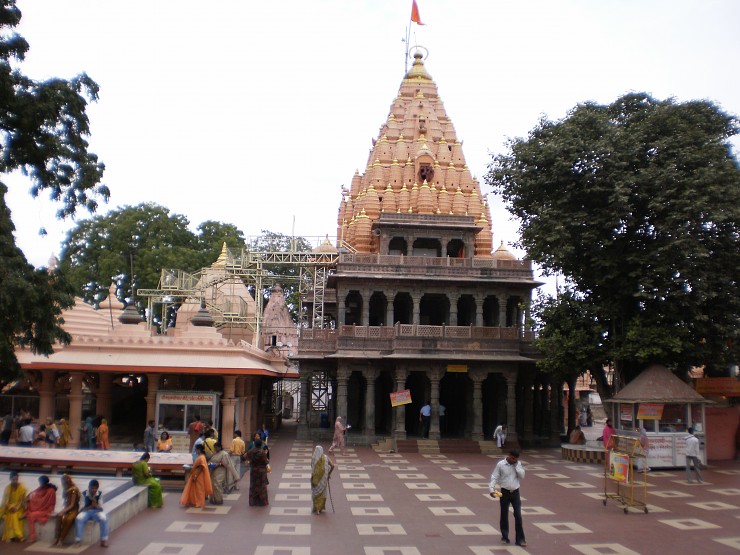
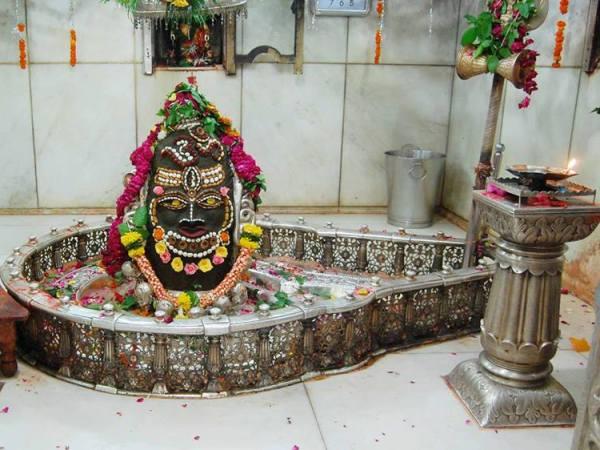
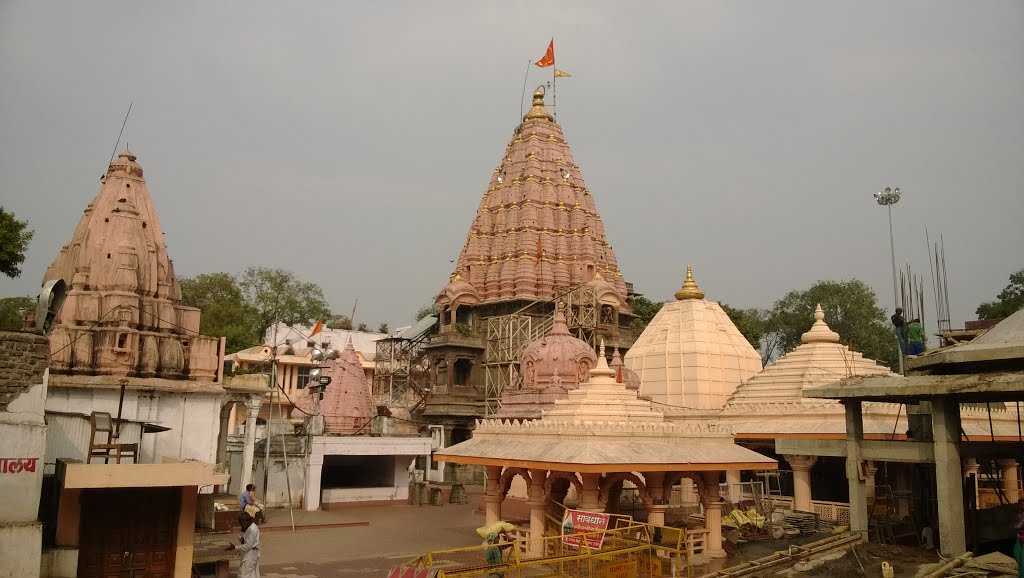
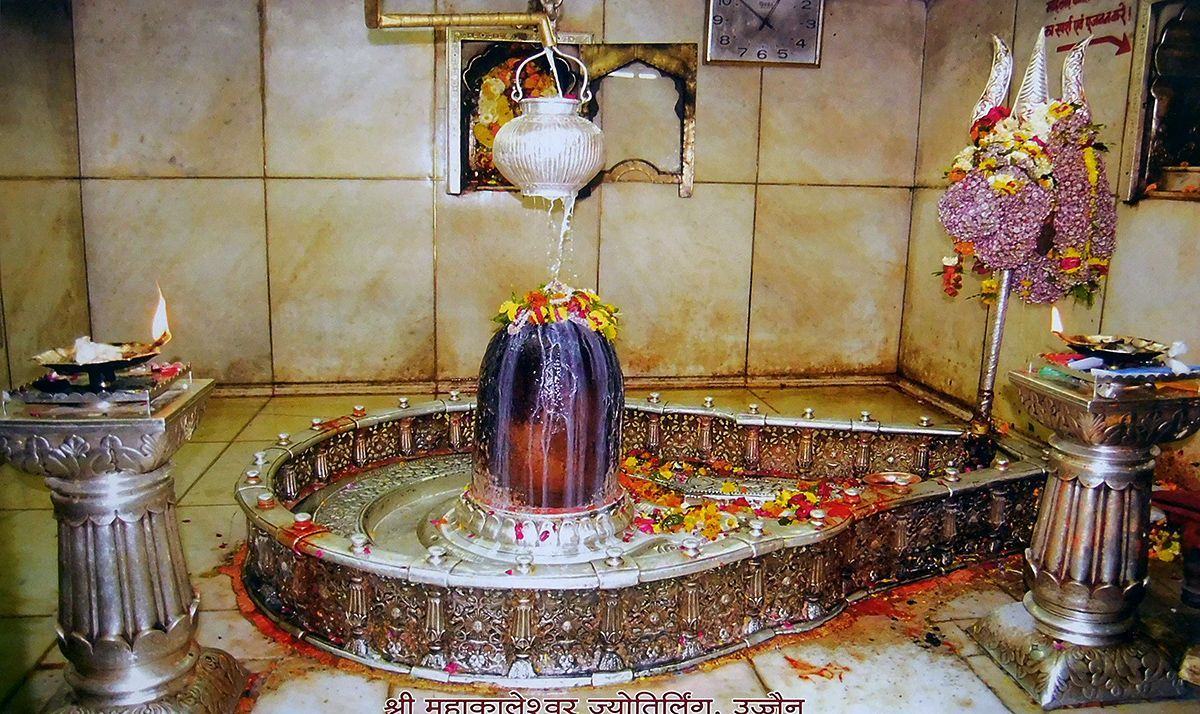
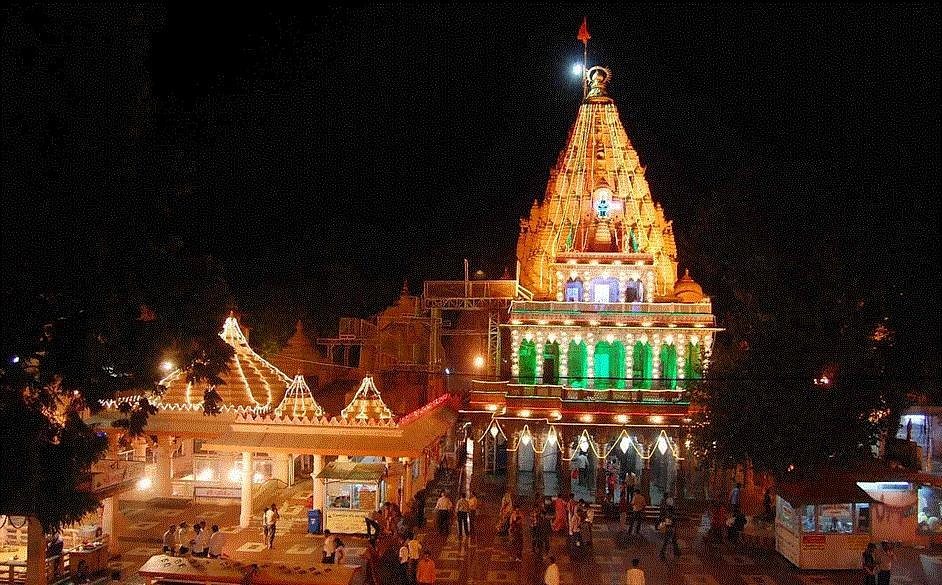
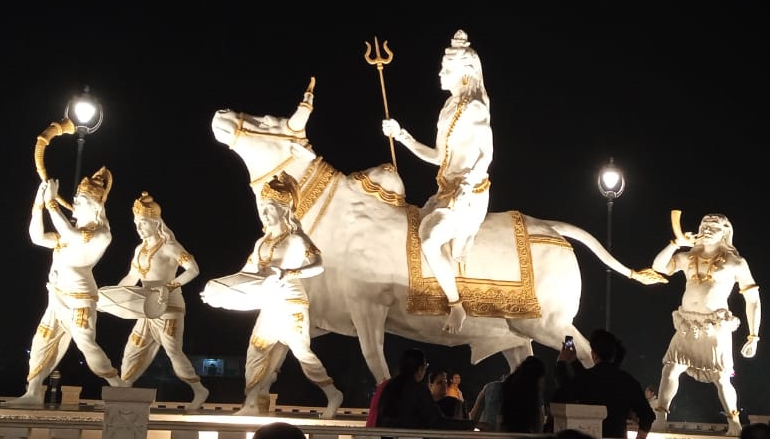
Temple
Mahakaleshwar Jyotirlinga is a Hindu temple dedicated to Shiva and is one of the twelve Jyotirlingas, shrines which are said to be the most sacred abodes of Shiva. It is located in the ancient city of Ujjain in the state of Madhya Pradesh, India. The temple is situated on the side of the holy river Shipra. The presiding deity, Shiva in the lingam form is believed to be Swayambhu, deriving currents of power (Shakti) from within itself as against the other images and lingams that are ritually established and invested with mantra-shakti.
Mahakal, Ujjain (or Avanti) in Madhya Pradesh is home to the Mahakaleshwar Jyotirlinga temple. The Lingam at Mahakal is believed to be Swayambhu, the only one of the 12 jyotirlingams to be so. It is also the only one facing south and also the temple to have a Shree Rudra Yantra perched upside down at the ceiling of the Garbhagriha (where the Shiv Lingam sits). It is a place where Shakti Peetha and jyotirlingam are together.
The idol of Mahakaleshwar is known to be dakshinamukhi, which means that it is facing the south.This is a unique feature, upheld by the tantric shivnetra tradition to be found only in Mahakaleshwar among the 12 Jyotirlingas. The idol of Omkareshwar Mahadev is consecrated in the sanctum above the Mahakal shrine. The images of Ganesh, Parvati and Karttikeya are installed in the west, north, and east of the sanctum sanctorum. To the south is the image of Nandi, the vehicle of Shiva. The idol of Nagchandreshwar on the third storey is open for darshan only on the day of Nag Panchami. The temple has five levels, one of which is underground. The temple itself is located in a spacious courtyard surrounded by massive walls near a lake. The shikhar or the spire is adorned with sculptural finery. Brass lamps light the way to the underground sanctum. It is believed that prasada (holy offering) offered here to the deity can be re-offered unlike all other shrines.
The presiding deity of time, Shiva, in all his splendor, reigns eternally in the city of Ujjain. The temple of Mahakaleshwar, its shikhar soaring into the sky, an imposing façade against the skyline, evokes primordial awe and reverence with its majesty. The Mahakal dominates the life of the city and its people, even in the midst of the busy routine of modern preoccupations, and provides an unbreakable link with ancient Hindu traditions.
On the day of Maha Shivaratri, a huge fair is held near the temple, and worship goes on through the night.
Devotees are not allowed to bring bags , mobile phones and cameras during the visit. Lockers and Cloak Rooms are there for devotees where they can keep their belongings.
Also an awesome spectacle, with huge participation of devotees, is the procession of God Mahakaal in his Palanquin, called Shahi Savaari, to the river Kshipra, on last Monday of the holy period of Sawaan during the months of Shraavana or Bhadrapada.
The Temple has a Shrine for Parvati known as avantika devi(goddess of ujjain city) behind the palki dwar at the back side of Ram Temple
The temple complex was destroyed by Iltutmish during his raid of Ujjain in 1234–35. The Jyotirlinga was dismantled and believed to be thrown into a nearby 'Kotiteerth Kunda' (a pond neighbouring the temple) with the Jaladhari (a structure supporting the Lingam) stolen during the invasion.
The present structure was built by the Maratha general Ranoji Shinde in 1734 CE after Baji Rao I appointed him to collect taxes in malwa region. Further developments and management was done by other members of shinde dynasty, including Mahadji Shinde (1730 – 12 February 1794) and Daulat Rao Shinde's wife Baiza Bai. (1827–1863). During the reign of Jayajirao Shinde (until 1886), major programs of the then Gwalior State used to be held at this temple.
The Maratha Empire regime was established in Ujjain in the 4th decade of the 18th century. The administration of Ujjain was assigned by Peshwa Bajirao-I to his faithful commander Ranoji Shinde, the Diwan of Ranoji was Sukhatanakar Ramchandra Baba Shenavi who was very wealthy he decided to invest his wealth for religious purposes. In this connection, he re-built the Mahakaleshwar Temple during the 4th and 5th decades of the 18th century.
After India became independent in 1947, the Mahakaleshwar Dev Sthan Trust was replaced by the municipal corporation of Ujjain. Nowadays it is under the collectorate office of Ujjain district.
Mahakaleshwar Temple, Harsiddhi Marg, Jaisinghpura, Ujjain, Madhya Pradesh 456001.
Ujjain, Madhya Pradesh
Airway: Nearest airport is Indore 53 km away from Ujjain. Flights arriving from Mumbai, Delhi, Ahmedabad, Gwalior.
Railway: Ujjain is directly connected by railway line to Ahmedabad, Rajkot, Mumbai, Fouzabad, Lucknow,Dehradun, Delhi, Banaras, Kochin, Chennai, Bangalore, Hyderabad, Jaipur, Howrah and many more.
Roadway: Ujjain is directly connected by road to Indore, Surat, Gwaliar, Pune, Mumbai, Ahmedabad, Jaipur, Udaypur, Nasik, Mathura.
There are many hotels, Rest House and dharamshals are available to stay here.
For men the dress code is Shirt & Trouser, Dhoti or Pyjamas with upper cloth. For women the preferred dress code is saree or half-saree with blouse or chudidhar with pyjama and upper cloth.
Devotees will not be allowed to use mobile phones in Mahakal Temple ground although they can use it in Mahakal Lok corridor.
Special
According to the Puranas, the city of Ujjain was called Avantika and was famous for its beauty and its status as a devotional epicenter. It was also one of the primary cities where students went to study holy scriptures. According to legend, there was a ruler of Ujjain called Chandrasena, who was a pious devotee of Shiva and worshiped him all the time. One day, a farmer's boy named Shrikhar was walking on the grounds of the palace and heard the King chant the Shiva's name and rushed to the temple to start praying with him. However, the guards removed him by force and sent him to the outskirts of the city near the river Kshipra. Rivals of Ujjain, primarily King Ripudamana and King Singhaditya of the neighboring kingdoms decided to attack the Kingdom and take over its treasures around this time. Hearing this, Shrikhar started to pray and the news spread to a priest named Vridhi. He was shocked to hear this and upon the urgent pleas of his sons, started to pray to Shiva at the river Kshipra. The Kings chose to attack and were successful; with the help of the powerful demon Dushan, who was blessed by Brahma to be invisible, they plundered the city and attacked all the devotees of Shiva.
Upon hearing the pleas of His helpless devotees, Shiva appeared in his Mahakala form and destroyed the enemies of King Chandrasena. Upon the request of his devotees Shrikhar and Vridhi, Shiva agreed to reside in the city and become the chief deity of the Kingdom and take care of it against its enemies and to protect all His devotees. From that day on, Shiva resided in His light form as Mahakala in a Lingam that was formed on its own from the powers of Shiva and his consort, Parvati. Shiva also blessed his devotees and declared that people who worshipped Him in this form would be free from the fear of death and diseases. Also, they would be granted worldly treasures and be under the protection of the Shiva himself.
Bharthari was the elder son of King Gandharva-Sena, and received the kingdom of Ujjain from the celestial god Indra and the King of Dhara.
When Bharthari was king of 'Ujjayani' (modern-day Ujjain) in his state there lived a Brahman who after years of austerities was given the fruit of immortality from the celestial tree of Kalpavriksha. The Brahman presented the same to his monarch, Raja Bharthari, who in turn, passed it on to his love, the beautiful, Pinglah Rani or Ananga Sena Raja Bhartrhari's last and youngest wife. The queen, being in love with the Head police officer of the state, Mahipaala, presented the fruit to him, who further passed it on to his beloved, Lakha, one of the maids of honour. Eventually, Lakha being in love with the king presented the fruit back to the king. Having completed the circle, the fruit revealed the downsides of infidelity to the king, he summoned the queen and ordered her beheading, and ate the fruit himself. After that, he abdicated the throne, and became a religious mendicant.
He later became a disciple of Pattinatthar who first indulged in an argument about samsari and sanyasi with king Bhartrhari. Later during the conversation pattinathar said that all women have 'dual mind' and it might be the true case even with Parameswari. King conveyed this news to Rani Pingalah and she ordered Pattinathar to get punished and to sit in kalu maram (tree, whose top portion would be sharpened like a pencil and whole tree is fully coated with oil, a person who is punished to sit in the top will be split into two pieces), they tried to kill Pattinathar, but Kalu Maram started burning and nothing happened to Pattinathar, the king received the news and went directly to Pattinathar and asked him to get ready to die the next day, but Pattinathar replied, "I'm ready right now, to die". The next day king came with tears in his eyes and released saint from jail because he actually noticed Queen Pingalah in love with horsemen that night, He threw away his empire, wealth, even full coat dress and dressed in a simple kovanam (loincloth), the king became a disciple of Pattinatthar and got moksha (salvation) in the Srikalahasteeshwara Temple in Andhra Pradesh which houses the Vayu Lingam, a part of the Pancha Bhoota Sthalams of Shiva.
Kalidasa, the great Sanskrit poet of the times who was probably a contemporary of king Pushyamitra Sunga, has mentioned about the rituals of the temple in his works in Meghadūta. He mentions about the nada-aradhana, the performance of art and dance during the evening rituals.
4:00 am - 11:00 pm
Bhashma Aarti 4:00am 6:00am. Morning Aarti 7:00am 7:30am. Evening Aarti 5:00pm 5:30pm.
| Live Darshan | www.live.com |
|---|---|
| Donation Link | www.donation.com |
| Prasad/Souvenier Link | www.souvenier.com |
| Pooja Booking Link | www.pooja.com |
| VIP Darshan Booking Link | www.vip.com |
